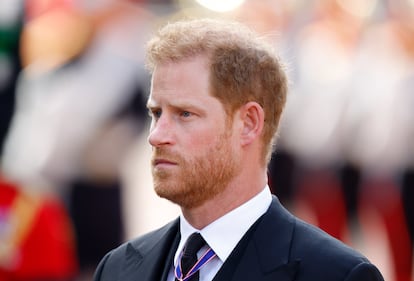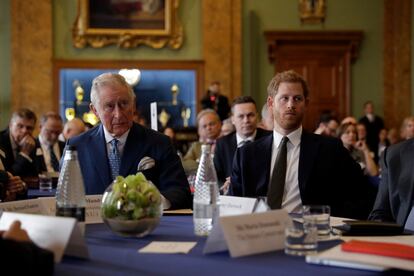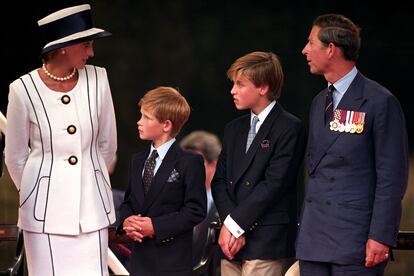Prince Harry sits down with Gabor Maté, the world’s leading trauma specialist
The Duke of Sussex chatted live with the famous Hungarian-Canadian physician on loss and lack of family affection

On March 4, one of the most unusual encounters in the history of the internet took place between Prince Harry and the Hungarian-Canadian physician and author, Gabor Maté, the world’s leading specialist in trauma. To be admitted, you first had to buy the Duke of Sussex’s book, Spare, which could be complemented by The Myth of Normal, Maté's latest work. I myself was skeptical about the encounter, which was widely criticized before it even took place.
However, as he sat in front of a cozy fire, Harry explained with disarming humility the reason behind the publication of his autobiography and, also, for the encounter with Maté: after two decades of struggling with his mental health, he needed to share his story to empower others to be themselves, irrespective of the conventions and expectations of others.
During his conversation with Maté, which lasted an hour and a half, we learned of the Prince’s difficulty in finding a therapist to help him break out of the bubble he had lived in since childhood. Only when he eventually found one could he begin to free the boy who had lost his mother, Diana, the Princess of Wales, at the age of 12. By definition, trauma is an emotional wound that has not healed, according to Maté. And the first step out of trauma is to recognize it for what it is.
Harry described the moment when his father, King Charles III, entered his room to announce the death of his mother by tapping him on the knee. After a brief “everything will be alright,” he left the room. The prince explained that 99% of people go through some kind of trauma, loss or unresolved pain. In his case, the absence of hugs from his father exacerbated an already extremely painful situation for him as a child. Maté noted that the fact that his father treated him coldly did not mean that he did not love him. He simply did not know how to express that love on account of his own upbringing.

Harry nodded in recognition of this fact and added that, as a father, he tries to cuddle and hug his two children, Archie and Lilibet, on a daily basis. He acknowledged that a turning point has been the publication of the book, as it had allowed him to revisit the trauma to understand it and not repeat the same mistakes with his own children as his father made with him. It was then, he said, that he was able to complete his healing and start being himself.
At this point in the conversation, Maté stated that in every life there is a crossroads between two paths and the choice is necessarily a painful one:
1. You can either choose the pain of not being yourself in order to please others.
2. Or you can opt for the pain of being yourself and risk losing the support of others.
Every human being must choose between these two options, but clearly only choice number two leads to personal fulfillment.
One of the most moving moments during their conversation was when Prince Harry talked about his episodes of depression and anxiety. At official events, he had to shake hands with a long line of VIPs, and he often felt uncomfortably hot and sweaty. When he detected sweat on the hands of someone he was supposed to greet, he would realize that person was also experiencing anxiety and would stop to talk to them, even if the protocol chiefs were urging him on. The connection helped him to feel better himself.

When asked about his tools for trauma and grief, Harry replied that one of them is to allow ourselves to mourn. He commented that during the periods he spent in Africa he saw local people spend two or three days actively mourning a loss, thereby helping them process it.
The other tool is conversation. Being able to talk to people who know how to listen is key to healing. Even if you express what you’re feeling through writing. In this respect, Harry confessed that he was initially scared of what the reaction to Spare might be. To reassure him, his publisher suggested he look at the Amazon reviews. When he did, the Duke of Sussex was amazed at the gratitude he received. “Feeling like I’m helping other people heal helps me heal,” he said towards the end of the conversation.
Maté added that, as well as having compassion and empathy for others, one must also have compassion and empathy for oneself. This is the first step to emerging from trauma and starting to live a free and authentic existence.
'The Myth of Normal'
In Gabor Maté’s latest book, The Myth of Normal, he explains that trauma is “not what happens to you, but what happens inside you.” To stop being a victim and reconnect to life, these fundamental needs must be met:
– Belonging, relatedness or connectedness.
– Autonomy; a sense of control in one’s life.
– Mastery or competence.
– Genuine self-esteem. Not dependent on achievement, attainment, acquisition, or valuation by others.
- Trust: a sense of having the personal and social resources needed to sustain one through life.
- Purpose, meaning, transcendence: knowing oneself as part of something larger than isolated, self-centered concerns.
Tu suscripción se está usando en otro dispositivo
¿Quieres añadir otro usuario a tu suscripción?
Si continúas leyendo en este dispositivo, no se podrá leer en el otro.
FlechaTu suscripción se está usando en otro dispositivo y solo puedes acceder a EL PAÍS desde un dispositivo a la vez.
Si quieres compartir tu cuenta, cambia tu suscripción a la modalidad Premium, así podrás añadir otro usuario. Cada uno accederá con su propia cuenta de email, lo que os permitirá personalizar vuestra experiencia en EL PAÍS.
¿Tienes una suscripción de empresa? Accede aquí para contratar más cuentas.
En el caso de no saber quién está usando tu cuenta, te recomendamos cambiar tu contraseña aquí.
Si decides continuar compartiendo tu cuenta, este mensaje se mostrará en tu dispositivo y en el de la otra persona que está usando tu cuenta de forma indefinida, afectando a tu experiencia de lectura. Puedes consultar aquí los términos y condiciones de la suscripción digital.








































